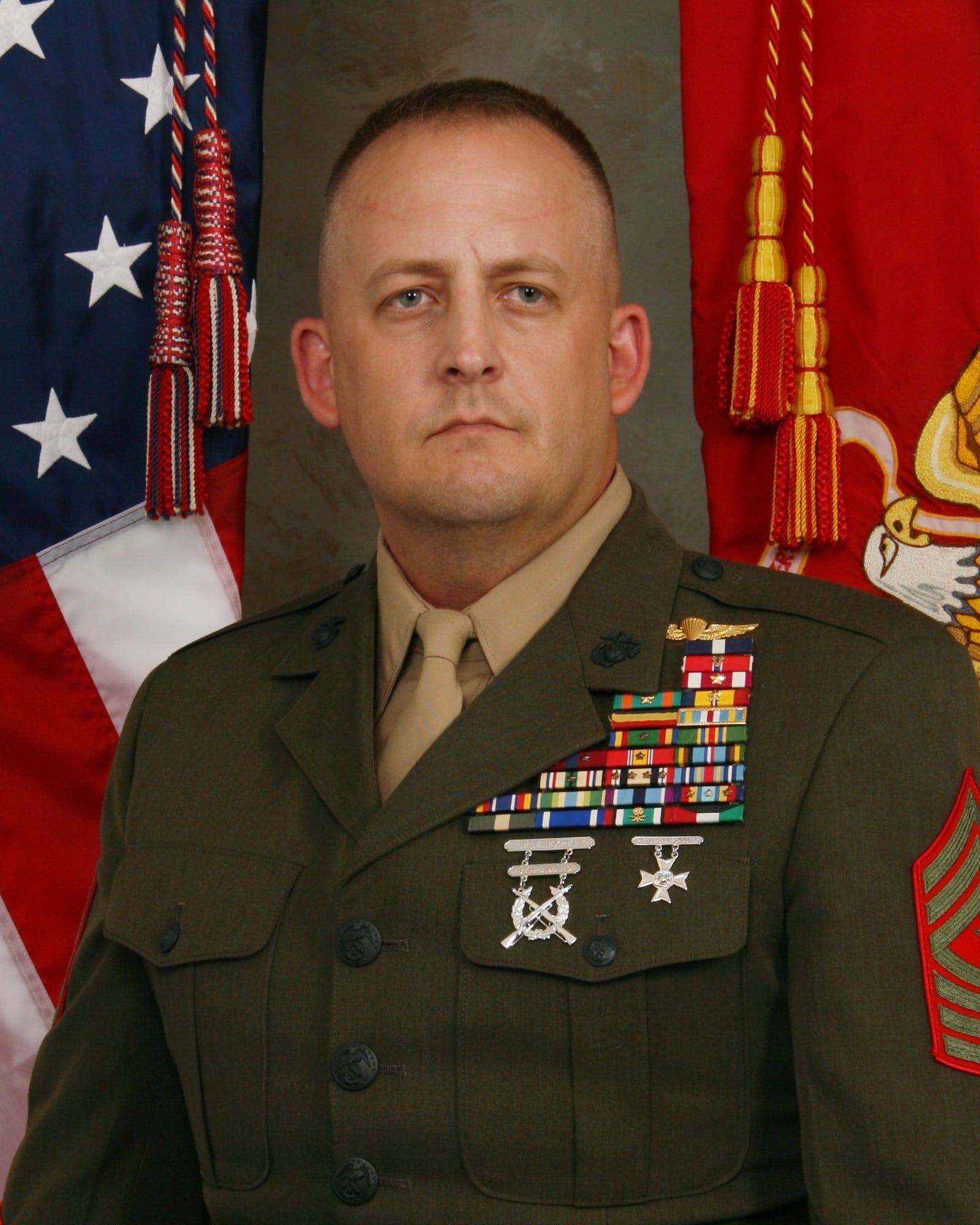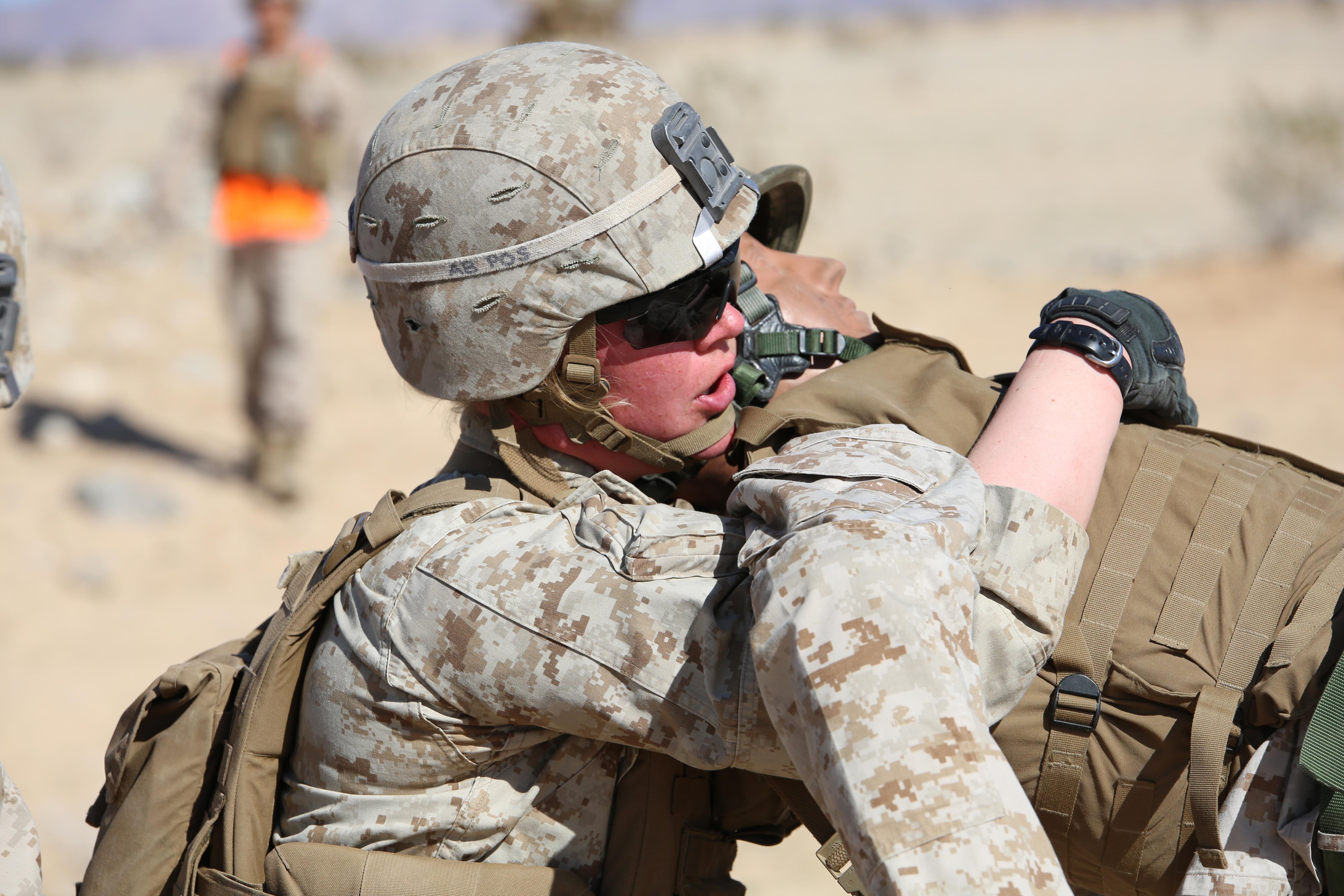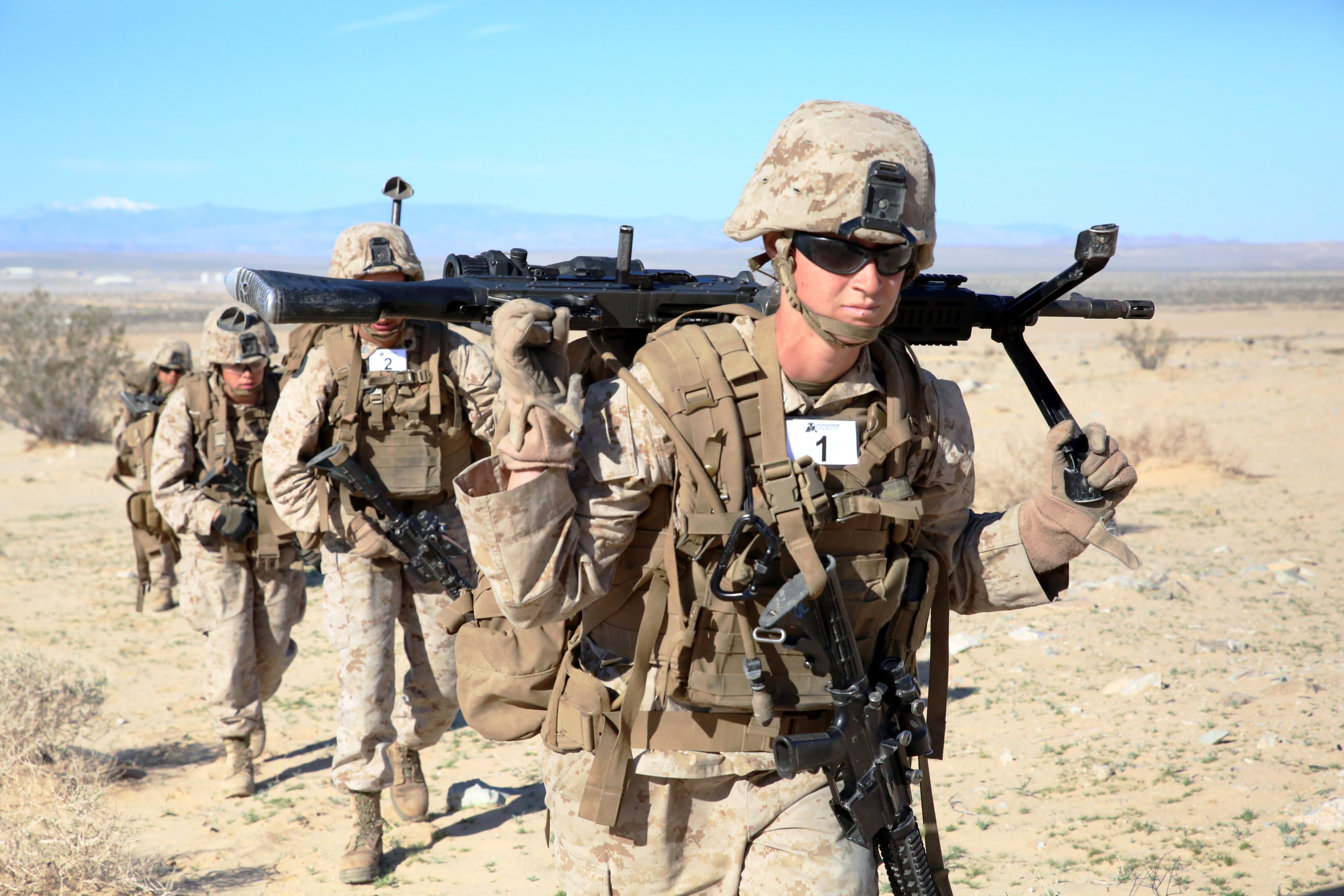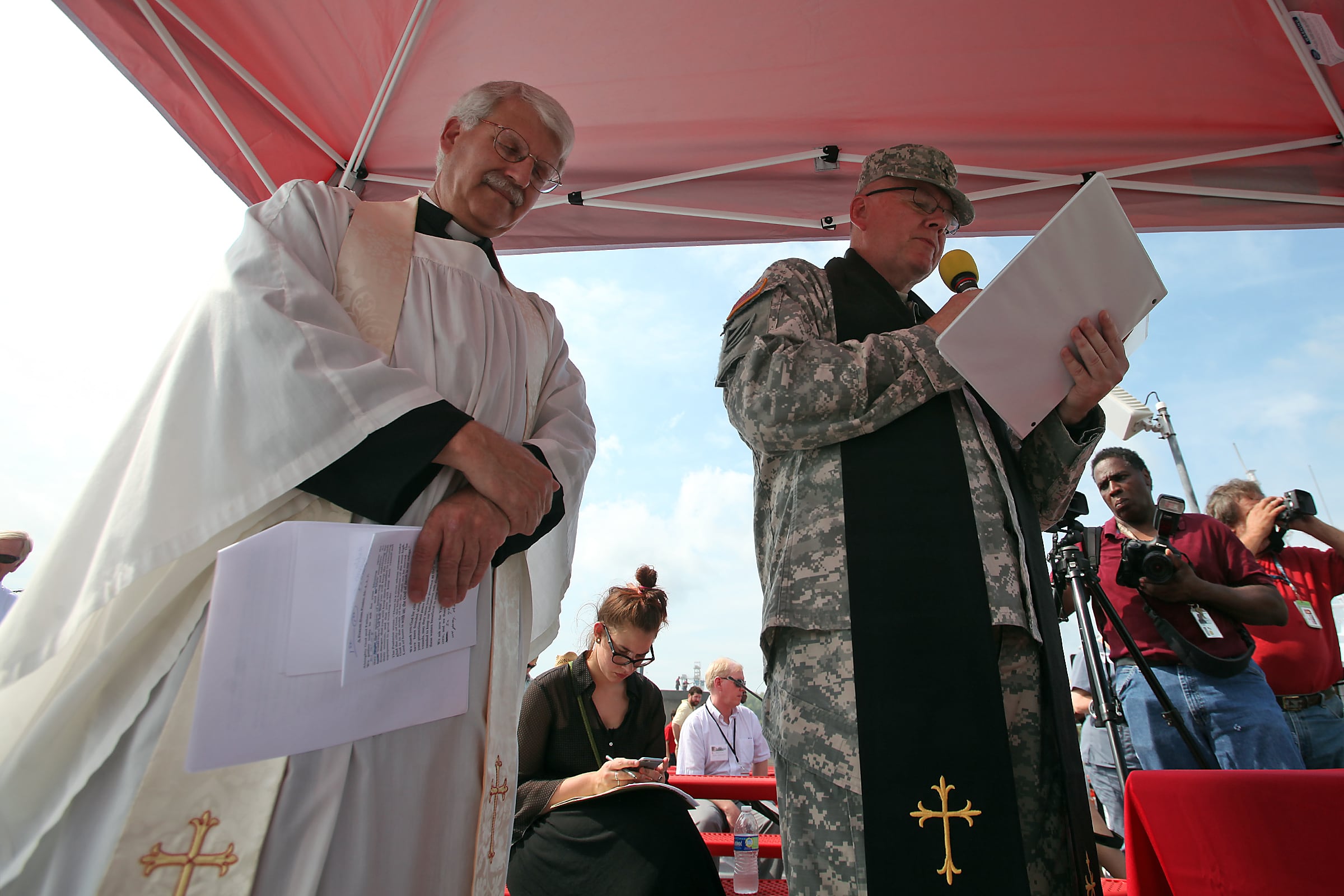An influential Marine leader who received recipient of the nation's second-highest valor award medal for combat heroism and helped run the Corps' monthslong study on women in combat slammed Navy Secretary Ray Mabus this weekend for questioning the validity of a the experiment Corps' months-long study on the effects of putting women in combat jobs.
In a publicly visible post on his personal Facebook page, Sgt. Maj. Justin LeHew said Mabus was "way off base" to suggest that female Marines of a higher caliber should have been selected for the service's Marines' integrated task force experiment and that officials went into the test anticipating the women would not be successful.

Sgt. Maj. Justin LeHew is a Navy Cross recipient and the top enlisted leader with Marine Corps Training and Education Command.
Photo Credit: Marine Corps
Mabus' comments run "counter to the interests of national security and [are] unfair to the women who participated in this study," wrote LeHew, who serves as the sergeant major of Marine Corps Training and Education Command and played a key role in organizing and staffing the service's Marines' nine-month women in combat experiment as the top enlisted leader with Marine Corps Training and Education Command.
"No one went in to this with the mentality that we did not want this to succeed," he added. "No Marine, regardless of gender, would do that."
LeHew later removed or hid the post from his Facebook page. He did not respond to Marine Corps Times requests' for comment sent via email and Facebook.
"Sgt. Maj. LeHew's social media posts reflect his personal views and not those of Training and Education Command or the Marine Corps," said 1st Lt. Matthew Rojo, a spokesman for the command. "He is not available for further comment at this time."
Both Marine Corps Headquarters and Ray Mabus, through a spokesman, declined to comment.
LeHew, nicknamed "The Hero of Nasiriyah," received the prestigious Navy Cross in 2004 for risking his life under heavy enemy fire to evacuate four soldiers and recover nine dead and wounded Marines soldiers following a 2003 ambush in Iraqi ambush. He was responding to comments Mabus made on during a Friday interview with NPR. He now serves as the sergeant major of Marine Corps Training and Education Command and played a key role in organizing and staffing the Marines' nine-month women in combat experiment.
Mabus sounded off on the Marine Corps' Ground Combat Element Integrated Task Force following the release of partial findings last week that showed combat units containing women performed more slowly and shot less accurately than all-male control groups, and that female volunteers had much higher injury rates over the course of the experiment.
"It started out with a fairly large component of the men thinking 'this is not a good idea' and 'women will never be able to do this,' " When you start out with that mindset, you're almost presupposing the outcome," Mabus told NPR Sept. 11. When you start out with that mindset, you're almost presupposing the outcome."
He added that there probably "probably there should have been a higher bar to cross to get into the experiment" for female volunteers.
In his Saturday Sept. 12 Facebook post, LeHew rebutted those claims, saying that the leaders who participated were the most mature, progressive and open minded in the Marine Corps.
called Mabus' comments unfair to the women of the task force and at odds with national security interests.
There was nothing "gender biased" about the results that showed men outperforming women in nearly all of the tasks, he wrote. And despite the data showing that the best women in the task force performed at or below the levels of the lowest 5 percent of male volunteers in the experiment, according to LeHew, LeHew wrote that Mabus has said stated that his mind was made up before those results were even released, he wrote.
Mabus said his mind was made up even before the results of the experiment were released, LeHew noted. But the data shows that the best women in the task force performed at or below the levels of the lowest 5 percent of male volunteers in the experiment, according to LeHew.
"Listen up folks. Your senior leadership of this country does not want to see America overwhelmingly succeed on the battlefield, it wants to ensure that everyone has an opportunity to [pursue]persue whatever they want regardless of the outcome on national security," LeHew said. [Mabus] has stated that he has made his mind up even before the release of these results and that the USMC test unit will not change his mind on anything," he wrote. "... Your senior leadership of this country does not want to see America
overwhelmingly succeed on the battlefield, it wants to ensure that everyone has an opportunity to pursue whatever they want regardless of the outcome on national security."
While LeHew said he gave "kudos" to the two female officers who recently graduated from the Army's Ranger School, the Marine Corps infantry is different, he said. In the infantry, he said, the Marines needed their fastest, most fit and most lethal members to defeat the enemy on the field of combat. This experiment, he said, proved that in every case those individuals were men.
"In regards to the infantry … there is no trophy for second place," he wrote. "You perform or die."
Similarly, he wrote, there will never be a female NFL quarterback or NHL center, or a woman batting in the clean-up spot for a team like the New York Yankees, he wrote. "You will never see a female quarterback in the NFL, there will never be a female center on any NHL team and you will never see a female batting in the number 4 spot for the New York Yankees," he wrote. "It is what it is."
If equality is the goal, LeHew added, the military should begin by requiring women to register for sSelective sService, as men must.
LeHew later removed or hid the post from his Facebook page. He did not immediately respond to a Marine Corps Times request for comment.
"Sgt. Maj. LeHew's social media posts reflect his personal views and not those of Training and Education Command or the Marine Corps," 1st Lt. Matthew Rojo, as spokesman for the command, said. "He is not available for further comment at this time."
Mabus' comments are part of a growing chorus of criticisms following the Marines' partial release of task force data.

Cpl. Katie Gorz, with the Corps' Ground Combat Element Integrated Task Force, carries a dummy during a simulated casualty evacuation. Data released by the Marine Corps last week shows that women struggled with moving the 200-pound dummy.
Photo Credit: Sgt. Alicia R. Leaders/Marine Corps
The Service Women's Action Network, which supports full integration of women into combat roles, denounced the findings, calling them "a skewed attempt" by the Marine Corps to set the stage to ask for exemptions to the Defense Department's Jan. 1 integration mandate.
"Comprehensive studies of gender-integrated military combat units in multiple countries have found that the participation of women does not measurably affect task cohesion — the ability of the unit to achieve its goals," SWAN CEO Judy Patterson said in a Sept. 10 statement. "The studies have also found that any initial impact women have on combat unit cohesion — the social bonds between its members — can be overcome through the influence of strong leadership within and above the unit."
And an official familiar with the Marines' integration experiment from the start of the task force last year said Corps officials the Marines should have released the full 978-page report the research generated, rather than cherry-picking data for a four-page executive summary. Moreover, said the official, who requested anonymity in order to speak freely, the Marine Corps should evaluate the ability of mixed-gender groups to meet a preset performance standard, rather than just pitting them against all-male groups.
"I think it's important for Americans and decision-makers not to be blinded by the bright, shiny object that comes at them first," the official said. "I think they should do a complete, replicable, rigorous synthesis of the data they have, with an emphasis on replicability."
Marine officials have said they plan to release the full findings of their integration study later this month.





